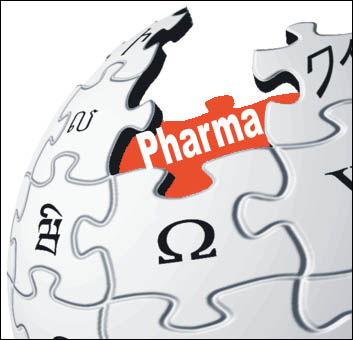Here Come the Pharma Wikipedians The Pros and Cons of Pharma Employees Editing Wikipedia Articles
By John Mack
 Should pharmaceutical companies appoint employees as Wikipedia “spokespeople” to perform all edits to Wikipedia articles on behalf of the company?
Should pharmaceutical companies appoint employees as Wikipedia “spokespeople” to perform all edits to Wikipedia articles on behalf of the company?
That is the opinion of Bertalan Meskó, MD, founder and managing director of Webicina.com, who, in a June 13, 2012, open letter to pharmaceutical companies, invited them to “employ a Wikipedia editor if you want to make sure only evidence-based information is included in entries about your own products.”
Open Letter to Pharma
Dear Pharma Companies,
The place of Wikipedia in the dissemination of medical information online is indisputable now. If you want your customers to access information about your products from the quality perspective and in the simplest way, you have to deal with using Wikipedia.
Based on the pretty negative past encounters between pharma employees and Wikipedia editors (pharma employees trying to edit entries about their own products in a quite non-neutral way), we advise you to employ a Wikipedia editor if you want to make sure only evidence-based information is included in entries about your own products. Appointing someone from within your company as a “spokesperson” in Wikipedia who would perform all edits on behalf of the company is an excellent way to update those entries.
For more details, please see our open access social media guide [see Webicina’s “Open Access” Social Media Guidelines for Pharma].
But basically, we, Wikipedians, are more than open to starting a discussion about this with you.
I’m looking forward to working together.
Boehringer Ingelheim responded to Berci via Twitter: “We look for patient safety issues & react. Its important to stick to Wikipedia policies too, so all transparent.” But when asked by Berci if BI had posted anything online about this, BI responded “No at this point in time we have not….yet,” seemingly leaving the door open.
Recall that PhRMA — in comments submitted to the FDA (see “Accountability for Pharma Content on Social Media Sites“) — suggested that manufacturers would welcome correcting misinformation about their products posted to sites like Wikipedia if these corrections were not subject to FDA regulation.
“FDA,” said PhRMA, “should confirm formally that, while it is not possible for manufacturers to monitor or correct all inaccurate information about their products on the Internet, such corrections by manufacturers in response to inaccurate postings will not be considered promotional labeling. FDA’s adoption of such a policy would thereby allow manufacturers to correct inaccurate information about their medicines on the Internet or social media (e.g., Wikipedia, Sidewiki, blogs, or other websites) if they should become aware of such information.”
Past Transgressions
Pharma does not have a stellar record when it comes to editing Wikipedia articles. According to Patients Not Patents, a group that “challenges the validity of medical patents before the United States Patent and Trademark Office,” Abbott Laboratories was a serial Wikipedia tamperer back in 2007. Here’s the press release that provided the evidence:
Newly available data show that employees of Abbott Laboratories have been altering entries to Wikipedia, the popular online encyclopedia, to eliminate information questioning the safety of its top-selling drugs.
In July of 2007, a computer at Abbott Laboratories’ Chicago office was used to delete a reference to a Mayo Clinic study that revealed that patients taking the arthritis drug Humira faced triple the risk of developing certain kinds of cancers and twice the risk of developing serious infections. The study was published in the Journal of the American Medical Association in 2006.
The same computer was used to remove articles describing public interest groups’ attempt to have Abbott’s weight-loss drug Meridia banned after the drug was found to increase the risk of heart attack and stroke in some patients.
The site’s editors restored the deleted information, but Abbott’s activities illustrate drug companies’ eagerness to suppress safety concerns, said Jeffrey Light, Executive Director of the Washington, D.C.-based advocacy group Patients not Patents. “The argument that drug companies can be trusted to provide adequate safety information on their own products has been used by the pharmaceutical industry to fight against government regulation of consumer advertising. Clearly such trust is misplaced. As Abbott’s actions have demonstrated, drug companies will attempt to hide unfavorable safety information when they think nobody is watching.”
The changes are part of over one thousand edits made from computers at Abbott’s offices. The data was obtained from WikiScanner, an independent site that allows users to look up anonymous changes to Wikipedia articles.
Selected Tweets from the 15-June-2012 #hcsmeu Chat
MattHut
 RT @paullikeme: I’ve been trying to get researchers more involved (http://t.co/Q3uhfrJy) and be transparent (http://t.co/yqfO8t5t) MattHut
RT @paullikeme: I’ve been trying to get researchers more involved (http://t.co/Q3uhfrJy) and be transparent (http://t.co/yqfO8t5t) MattHut


 Importance of Wiki for Pharma IMHO clear. Qs are rather about the how. (method, HR, budget, etc…) pharmaguy
Importance of Wiki for Pharma IMHO clear. Qs are rather about the how. (method, HR, budget, etc…) pharmaguy @matthut I think pharma et al recognize importance of wikipedia, but unsure how to live with it w/o being cited for “manipulation” pharmaguy
@matthut I think pharma et al recognize importance of wikipedia, but unsure how to live with it w/o being cited for “manipulation” pharmaguy When I say “live with” wikipedia, I mean use it to advantage, eg corr misinformation, write original articles, etc. drpenzesjanos
When I say “live with” wikipedia, I mean use it to advantage, eg corr misinformation, write original articles, etc. drpenzesjanos I hope there will be good examples for the Pharma-Wiki issue soon, very necessary. Good starting point: http://t.co/f710VZ7DSpitzStrategy
I hope there will be good examples for the Pharma-Wiki issue soon, very necessary. Good starting point: http://t.co/f710VZ7DSpitzStrategy Any pharma participation with “crowdsourced” content becomes suspect MattHut
Any pharma participation with “crowdsourced” content becomes suspect MattHut

 @MattHut Completely agree. If content is king, and Wikipedia is the president of online content, we need to ensure it is accurate. SpitzStrategy
@MattHut Completely agree. If content is king, and Wikipedia is the president of online content, we need to ensure it is accurate. SpitzStrategy Pharma ultimately needs to make sure the clinical data related to their solutions is accurate on Wikis MattHut
Pharma ultimately needs to make sure the clinical data related to their solutions is accurate on Wikis MattHut
 So pharma role vis-a-vis Wikipedia should be content accuracy drpenzesjanos
So pharma role vis-a-vis Wikipedia should be content accuracy drpenzesjanos @SpitzStrategy Or is it the more crowdsourced the less suspicious? SpitzStrategy
@SpitzStrategy Or is it the more crowdsourced the less suspicious? SpitzStrategy Pharma needs to fact check data related to their treatment solutions — not produce original content or guide article creation drpenzesjanos
Pharma needs to fact check data related to their treatment solutions — not produce original content or guide article creation drpenzesjanos @SpitzStrategy Why say no for original content from Pharma? SpitzStrategy
@SpitzStrategy Why say no for original content from Pharma? SpitzStrategy Inherent suspicion of bias: RT @drpenzesjanos: @SpitzStrategy Why say no for original content from Pharma? >SpitzStrategy
Inherent suspicion of bias: RT @drpenzesjanos: @SpitzStrategy Why say no for original content from Pharma? >SpitzStrategy @pharmaguy Agree, but Wikipedia is ultimately about peer contributions, shared editorial responsibilities and fact checkingpharmaguy
@pharmaguy Agree, but Wikipedia is ultimately about peer contributions, shared editorial responsibilities and fact checkingpharmaguy @spitzstrategy “correcting” “misinformation” is the most suspicious wikipedia activity of all! IMHO.>SpitzStrategy
@spitzstrategy “correcting” “misinformation” is the most suspicious wikipedia activity of all! IMHO.>SpitzStrategy @pharmaguy Disagree — who else will police Rx data on Wikipedia if not the pharma companies themselves? drpenzesjanos
@pharmaguy Disagree — who else will police Rx data on Wikipedia if not the pharma companies themselves? drpenzesjanos Biased stuff can still be valuable. It is a certain POV. RT @SpitzStrategy: Inherent suspicion of bias >MattHut
Biased stuff can still be valuable. It is a certain POV. RT @SpitzStrategy: Inherent suspicion of bias >MattHut
 @spitzstrategy The fox cannot be trusted to check the hen’s “facts” 🙂 SpitzStrategy
@spitzstrategy The fox cannot be trusted to check the hen’s “facts” 🙂 SpitzStrategy @MattHut People generally swallow Wikipedia content whole, with little to know incredulity — even docs! pharmaguy
@MattHut People generally swallow Wikipedia content whole, with little to know incredulity — even docs! pharmaguy @spitzstrategy Whoa! Police? Is that how pharma wants to position itself? SpitzStrategy
@spitzstrategy Whoa! Police? Is that how pharma wants to position itself? SpitzStrategy More like “interested librarian” ensuring accuracy: RT @pharmaguy: Whoa! Police? Is that how pharma wants to position itself? SpitzStrategy
More like “interested librarian” ensuring accuracy: RT @pharmaguy: Whoa! Police? Is that how pharma wants to position itself? SpitzStrategy Remember, we’re dealing with highly regulated, FDA approved, clinically validated content — a KM-curve isn’t subject to “opinion” pharmaguy
Remember, we’re dealing with highly regulated, FDA approved, clinically validated content — a KM-curve isn’t subject to “opinion” pharmaguy @spitzstrategy I always hated librarians — “Shhhhh…” peeps & censorship. They are a dying breed, No love lost.
@spitzstrategy I always hated librarians — “Shhhhh…” peeps & censorship. They are a dying breed, No love lost.
PMN116-02
Issue: Vol. 11, No. 6
June 29, 2012
Word Count: n/a
Find other articles in related Topic Areas:



![6 Digital Tools at the Center of Healthcare Digitalization [INFOGRAPHIC]](http://ec2-54-175-84-28.compute-1.amazonaws.com/pharma-mkting.com/wp-content/uploads/2021/04/6DigitalTools_600px-218x150.jpg)




![6 Digital Tools at the Center of Healthcare Digitalization [INFOGRAPHIC]](http://ec2-54-175-84-28.compute-1.amazonaws.com/pharma-mkting.com/wp-content/uploads/2021/04/6DigitalTools_600px-100x70.jpg)




